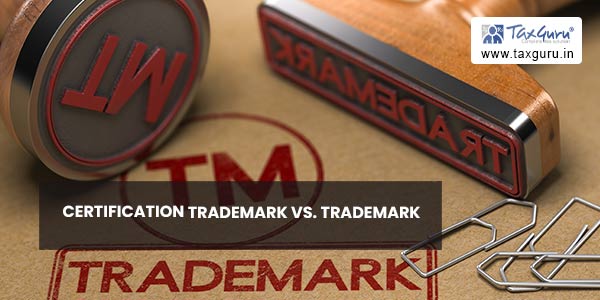Article explains Definition of certification trade mark, What A certification mark denotes, Difference between Trademark and Certification Mark Where to get a certification mark, Procedure for Registration of certification trademarks and Cancellation of registration of a certification trademark.
Page Contents
Definition of certification trade mark
SECTION-2 of Trademark act, 1999
Section 2 (e) “certification trade mark” –
means a mark capable of distinguishing the goods or services in connection with which it is used in the course of trade which is certified by the proprietor of the mark in respect of origin, material, mode of manufacture of goods or performance of services, quality, accuracy or other characteristics from goods or services not so certified and registrable as such under Chapter IX in respect of those goods or services in the name, as proprietor of the certification trade mark, of that person;
A certification mark is a mark placed on a product to show that it complies with all applicable rules and regulations. It enables a business to demonstrate to customers that its goods are of a high standard, meet all regulations, and have the required documentation. In this post, we’ll clarify the differences between certification marks and trademarks, learn what a certification mark denotes, and learn how to get one.
A certification mark denotes what?
A certification mark demonstrates that your goods and services have undergone extensive quality, origin, and material testing. Certification bodies certify that a product complies with requirements and grant permission for businesses to use a certain kind of certification mark on their products. It demonstrates the existence of a contract between a producer and international testing agencies. The quality and safety of goods from many international brands are governed by this agreement. A product or service has a certification mark if it satisfies certification centre standards. A government organization that registers a certification mark does so after approving the product’s calibre. There are various kinds of markings. They can reveal the precise location and method of production of an item. For instance, you can tell if a product was made from recycled materials by looking at its certification mark. The types of marks are not subject to any specific regulations. Although they don’t have to, it’s common to see products with “certified” mentioned on their packaging.
It’s time to discover the different qualities of certification marks and trademarks now that you are aware of why brands want certification markings. This is because people believe that they define things similarly. In actuality, they signify several processes and are applied in very distinct contexts.
Trademark vs. Certification Mark
These terms are frequently misunderstood, so we’ll give you a thorough explanation of each. You’ll be able to tell if you’re referring to a certification mark or a trademark in this way.
A certification mark is a unique mark used to indicate that a product satisfies the criteria and specifications of certifying bodies. They examine the provenance, calibre, composition, and other attributes of goods and services. Products must adhere to the established requirements. Since certification marks serve as proof of the existence of uniform national regulations, businesses cannot claim ownership of them. The agreements between manufacturers of items and testing agencies are supported by a certification mark. A trademark is a term, symbol, phrase, or design that identifies a particular corporation as the rightful owner of a product. It guards against any infringements or damaging reputational influences from other companies. Your brand and product are protected with a trademark. A trademarked word, symbol, or design connected to your goods will deter dishonest behavior from rivals and safeguard your assets.
In simple terms, a certification mark shows that a product was created in accordance with generally recognized laws and regulations, whereas a trademark identifies the source of a product and aids in the owner’s protection of ownership rights over goods and services.

Now that the distinction is obvious, let’s move on to the following section to discuss how to obtain a certification mark.
Where can I get a certification mark?
The procedure for obtaining a certification mark for goods and services can occasionally worry individuals. Although the process will take some time and work, your products’ quality, materials, and country of origin will be accepted.
You must prepare the following paperwork in order to receive a certification mark:
- your legal name, home address, and email address; the sort of legal entity you are; and your citizenship (US or international);
- a thorough explanation of your mark;
- an English translation (for people whose documents are in a foreign language);
- a sketch of your mark;
- a list of the goods for which you want to obtain a certification mark;
- filing basis and filing fee (a charge from a government agency)
Once you have read each of the aforementioned documents, you may apply for the certification mark. Use of the Trademark Electronic Application System is required for this. Everything can be done online. You’ll be informed when the mark is prepared.
Although certification marks vary depending on the products you use them for, they always serve the same purpose—protecting the rights of consumers. They serve as proof that goods and services are secure and produced in accordance with agreed norms. You must submit the required documentation in order to receive the mark, then you must wait till everything is completed.
Procedure for Registration of certification trademarks
The certification trademarks must be registered in the classes of products or services that are being certified by the applicants. A Statement of Case outlining the application’s grounds—that is, the justifications for why the applicant is qualified to file the application—must be submitted along with a certification trademark application. It’s crucial to remember that each certification trademark application must be accompanied by a draft regulation that contains specific provisions relating to the applicant’s suitability to manage the certification scheme, the attributes of the mark being certified, the process for observing the use of the mark, etc. The types of information that must be provided in certification trademark applications are specifically outlined in the Trade Marks Act of 1999.
When an application to register a certification trademark is submitted, the Indian Trade Marks Registry must determine whether the application complies with all applicable legal requirements. One of these requirements is that the certification trademark must be able to distinguish certified goods and services from uncertified ones. The application will be published in the Trade Marks Journal after the Registry is confident that all legal requirements have been met. For a period of four (4) months, any third party may object to the application. The certification trademark will be registered if there is no objection or if the opposition action has been concluded in the applicant’s favor. A certification trademark has a ten (10) year registration period.
Cancellation of registration of a certification trademark
If an aggrieved person contacts the Registrar, the registration of a certification trademark may be revoked. However, unlike trademarks, certification trademarks have various grounds for revocation.
According to Indian law, the Registrar may revoke the registration of a certification trademark or alter the proposed regulations for any of the following reasons:
- The proprietor is no longer qualified to certify any of the goods or services for which the mark is registered;
- The proprietor has failed to adhere to any requirements of the regulations that must be adhered to on his part; or
- It is no longer to the public’s benefit.
- That changing the rules is necessary for the benefit of the public if the mark is kept registered.
Conclusion
In India, examples of some well-recognized certification trademarks are ISI, WOOLMARK, AGMARK, BIS, and HALLMARK.
*****
For any type of assistance feel free to contact or reach us at: – MG Associates (Company Secretaries)- CS Manisha Mittal – 70152-77705
Disclaimer: The information presented here is only meant to be informative. Although this article was carefully crafted, it should only be regarded as general advice because it has been expressed in general terms. You should not act on the information provided in this article or refrain from acting upon it without first seeking professional advice since it cannot be relied upon to address your unique situation.





